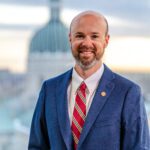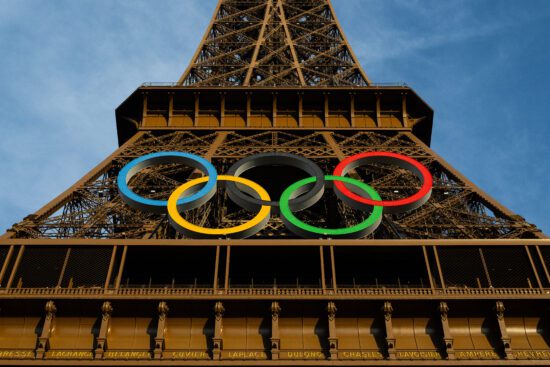I’m a little embarrassed to admit this considering I’m a professor at a Baptist seminary, but how I came to be a passionate Baptist was not because I thought baptism by immersion was the most compelling foundation. In a roundabout way, I became the convictional Baptist I am today because Baptist ecclesiology was the natural outcome of what I understood as the correct understanding and practice of religious liberty. That may sound confusing, so let me unpack it from the beginning.
I grew up in central Illinois going to a Southern Baptist Church (Lincoln Avenue Baptist Church in Jacksonville). If you’re outside the geographic South growing up in church, you may have attended a Southern Baptist Church without any real sense of feeling explicitly Baptist. That’s because in the North, at least in my experience, we didn’t see ourselves as very much Baptist as much as we did just Bible-believing evangelicals. If you would have asked me as a teen if I were a Baptist, I would have answered “yes” but only because I understood that I was not Catholic.
Feeling a call to ministry, I went to a Baptist college in southwest Missouri. Upon graduation, I went to the seminary where I now teach, The Southern Baptist Theological Seminary. At both institutions, I took Baptist history classes and became aware of our history and theological distinctives, which I appreciated at the time, but still did not feel overly zealous about. This was not the fault of the professors. Looking back, I recall my two Baptist history classes to be well taught and the professors passionate about their subject. Perhaps owing to my general immaturity, ideas like regenerate church membership, believer’s baptism, baptism by immersion, local church autonomy, and religious liberty did not really animate me. That does not mean I disagreed with them; I did agree with them because they simply seemed biblical. But ecclesiology was not front and center in my earlier theological angst. Questions like Calvinism, inerrancy, and the Emergent Church were front and center.
It was not until I “came of age” that my first jobs, incidentally, would lead me in a more fervently Baptist direction more so than my formal education in Baptist institutions. My first jobs out of seminary were for think tank and advocacy organizations that focused on social conservative causes like life, marriage, and, well, religious liberty. I had heard of the issue, but at the time, I did not understand the urgency of the issue. What is now a token issue of concern for evangelicals, a decade ago, was not. In 2008-2010, it was a different cultural climate. Much of the religious liberty challenges we’re encountering now were predicted, at the time, by documents like the Manhattan Declaration. This joint document of Catholic and Protestant luminaries declared in somber tones that were the government to continue its leftward lurch, a reassertion of religious liberty rights would be necessary as well as the possibility of civil disobedience. I knew I was treading in deep, turbulent waters. As I was getting my feet beneath me career-wise, I recall having to play catch-up on an issue that I was told was fundamental but was now threatened.
So, I got to work in both Kentucky’s capital and our nation’s capital on, among other things, religious liberty. I was largely unfamiliar with it, aside from what little I had learned about it in my Baptist history classes. It certainly was not, at the time, the top-tier pillar or foundation to my public theology like it is now. My work required me to read on the subject, and that’s what I did. It was not so much a heavy reading load in religious liberty theory (though there was that) inasmuch as I immersed myself in the advocacy world of social conservatism, which necessarily and rightly treated religious liberty as a lifeblood-like issue. It did not take long until I was convinced. Being someone enamored with the intersection of first principles, theology, and political philosophy, religious liberty afforded me the opportunity to merge together topics that I was already passionate about, but whose inchoate understanding still needed tuning.
As I would learn, the posture a state takes toward religion is one of the most decisive postures it will take in whether it will be broadly pluralistic and limited, or tyrannical and coercive. I would also learn that unless you have the requisite liberties to act on your convictions, then you cannot do much of anything, whether worship in your church or advocate in the public square. To not possess the freedom to act on one’s most primary beliefs means one is not free in even the most basic idea of the word. The idea that persons are endowed with self-seeking capacities that endear them to religion were making more and more sense. Life, I came to understand, required various types of liberties (speech, associational, religion) to make it meaningful and worthwhile. The presence of these liberties would decide what type of life someone would have in their community.
It led to a flood of first principle questions, among them:
- How does one understand what truth is?
- How does an individual come to grasp religious claims?
- What posture should the state take toward religion?
- How is one’s quest to understand truth related to their personhood?
- What’s the relationship between moral obligation and religious foundation?
- What are one’s obligations to the state? To God?
- What are the jurisdictions and responsibilities of the state?
- What are the jurisdictions and responsibilities of the church?
- Who gets to decide who is right and wrong about such matters as religion and morality?
- What’s the relationship between religious liberty and other liberties?
When I began to answer these questions, they led me in an inevitably and distinctly Baptist ecclesiology. It was in the Baptist tradition, which had helped birth religious liberty in North America through the likes of Roger Williams and John Leland, that I saw the principles of religious liberty most fulsomely applied. How so? Because the questions above are best answered in light of key Baptist ecclesiological distinctives that focus upon the individual and the associations they form in their life.
Like an outwardly working concentric circle, religious liberty hinges upon an understanding of (1) individual assent, (2) group association, and (3) institutional distinction. These are reflected in the practices of individual conversion and regenerate church membership, which entails a distinction between membership in the church and membership in society, and the institution of the gathered church being distinct from the institution of the state.
In the next post, I’m going to explain what these three principles mean in greater depth.










